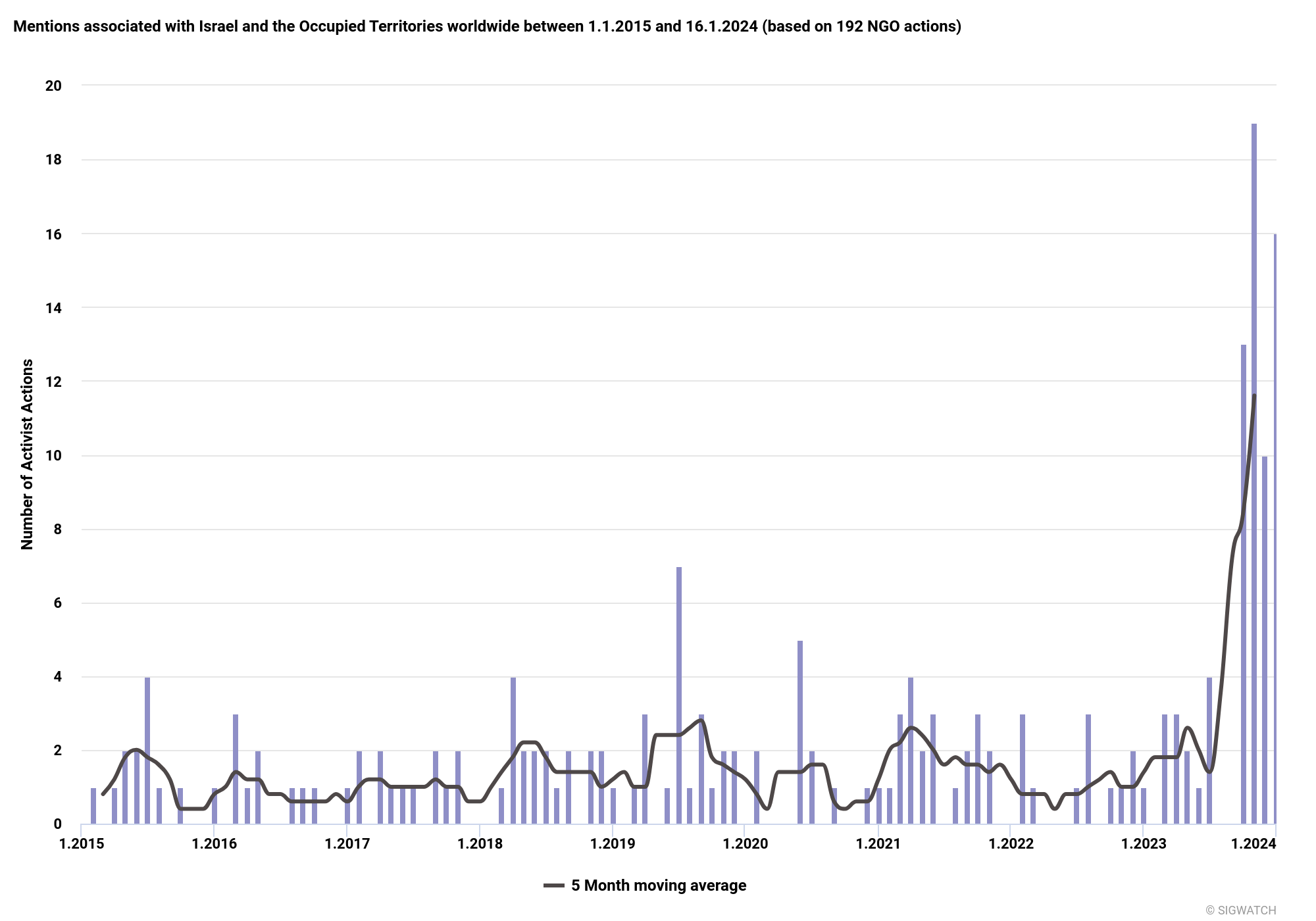
This Sunday, six activists from Palestine Action were arrested over an alleged plot to disrupt trading at the London Stock Exchange. They were taken in on suspicion of conspiracy to cause criminal damage.
This action is the latest in a significant rise in global campaigning criticising Israel’s war in Palestine, with activists condemning governments as well as firms such as Barclays, Starbucks, McDonald’s, HSBC, BNP Paribas, Caterpillar, Puma, Airbnb, Siemens, and Hyundai.

Alongside human rights groups like Human Rights Watch, Amnesty International and Oxfam International, issue-specific groups like War on Want, and Don’t Buy into Occupation Coalition have also been targeting companies for their financial relationships with illegal Israeli settlements – and this clamour is getting louder. Environmental groups such as Friends of the Earth, Ecologistas en Accion, Greenpeace, Oil and Gas Action Network (OGAN), and national branches of 350.org are also taking note.
In the UK, Palestine Action, the group that planned to disrupt the London Stock Exchange, has been the force behind some of the most disruptive actions, particularly those targeting Israeli military tech firm Elbit Systems.
So, who are they?
Formed in 2020, Palestine Action is a UK-based grassroots movement attempting to ‘end British complicity with the colonisation of Palestine’. While some members do operate in ‘underground cells’, they might be recognisable by their trademark red boiler suits and matching red paint.
Palestine Action’s primary focus for disruptive action so far has been Elbit Systems, however, they have named 50 other logistics, banking, manufacturing, legal, consulting, real estate and data firms and organisations including the Ministry of Defence, Barclays Bank, the Foreign Office as targets for their business links to Elbit. Government institutions and agencies have also come under attack for awarding contracts to Elbit and its allies. In a clear sign of the investigative abilities of Palestine Action, even the landlords leasing land and factory space to Elbit have found themselves at the sharp end of an ‘office redecoration’.
In a move that echoes both Extinction Rebellion, and the militant animal rights campaigns of the 90s, Palestine Action mainly uses disruptive forms of direct action to get its point across. From throwing paint at offices, to ‘locking-on’ at factories, to blocking roadways – the group seems to prioritise disruption and inconvenience over the awareness raising tactics favoured by established rights groups. In fact, it is perhaps no coincidence that Palestine Action’s tactics are so similar to those of Extinction Rebellion – the latter has taken on a greater focus on social justice issues over the past few years, so it is quite possible that there is some overlap in membership between the two causes.
Where is This Activism Headed?
With the violence in Gaza crossing the 100-day mark and the simultaneous unfolding of the genocide case brought by the Republic of South Africa against Israel at the International Court of Justice, attention on the Israel-Palestine situation is unlikely to fade away any time soon.
While citizens of Western countries continue to march for the Palestinian cause on a near regular basis, we can expect activist groups to maintain pressure on private entities and governments. As the environmental impact of the war is also being drawn into focus, with reports stating that the first two months of Israel’s war in Gaza “produced more planet-warming gases than 20 climate-vulnerable nations do in a year”, a growing alignment between the pro-Palestine cause and environmental groups is likely to continue. Governments and companies should expect to see more intense campaigning from across the activist spectrum on this issue – and we will almost certainly hear more from Palestine Action.
What our clients say
What our
clients say
“In our experience, SIGWATCH is one of the few sources of ESG data we can absolutely trust to be reliable.”
“Our company is based in Japan. Most employees are Japanese and we don’t really know what is happening around the world. SIGWATCH gives us visibility of the global ESG issues and trends we need to have on our radar.”
“With SIGWATCH, we’re able to absorb NGO data in an awesome way that
simply wouldn’t be possible otherwise. We can hear the NGOs’ voice, to better
strategize and get ahead of trending issues.”
“With social listening, we’re limited to knowing what people are saying only about OECD. With SIGWATCH, we see not only what is being said about us, but also what is being said about everyone else.”
“A lot is said and written about sustainability and ESG every day but no one,
apart from SIGWATCH, provides the big picture, SIGWATCH offers a comprehensive overview of what’s happening in the corporate sustainability
world rather than just a narrow snapshot.”
“SIGWATCH is a good source to show that NGOs are watching us and watching our clients, and we definitely need to be aware of the issues they are bringing up.”

